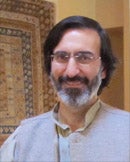Georgetown University Hosts the Author of “The Spirit of Tolerance in Islam”

Georgetown University in Qatar recently hosted a lecture featuring renowned comparative religion scholar Dr. Reza Shah-Khazemi, in a presentation and discussion about his book The Spirit of Tolerance in Islam, where he examines the historical record of religious tolerance in Islam, and ties that history to the foundations of religious law regarding the treatment of religious diversity, as expressed in the Quran and in the teachings of the Prophet Mohammed.
Over the course of the lecture, Dr. Shah-Kazemi gave historical examples of the religious tolerance of Muslims, and compared them to the comparative intolerance of Europe at that time. Citing the work of various Islamic scholars, he quotes one as saying “the notion of religious tolerance [in the West] is basically borrowed from Islam.”
Stressing the importance of avoiding a competitive approach to religious comparison, Shah-Kazemi instead points out the importance of establishing a point from which prevalent stereotypes about Islam can be corrected. “One of the main purposes of this book is to show the falsity of the idea that Islam and Muslims today are intolerant because Muslims have always been intolerant, and because their theology is intolerant.” Instead, he demonstrates how in Islamic history, “persecution was a deviation from a norm which was tolerant.”
Not content to proffer a history of Islam that presents surprising models of religious diversity, Shah-Kazemi then demonstrates how the principles of tolerance are not simply examples of political pragmatism, but are firmly rooted in the Quranic text and embodied in the exemplary character of the Prophet Mohammed.
“The Prophet is described as “ahlam innass” – the one most possessed of the quality of forbearance, of having self restraint and wisdom. We can’t appreciate the spirit of tolerance in Islam without understanding the meaning, and influence, and the radiance of this key prophetic virtue.” He argues that this prophetic virtue is combined with illm [wisdom] and rahma [loving compassion or mercy] to present the complete example of prophetic tolerance, and furthermore, presents the model of behavior that all Muslims are instructed to establish in their own lives.
He concluded the inspiring lecture by encouraging a return to the fundamental lessons of tolerance in Islamic tradition, saying “It’s because rights of minorities are decreed by revelation, that you have to see those rights as sacrosanct and inviolable. To violate them, is to violate the Revelation.” As compelling evidence of this important lesson, he quoted the final public address of the Prophet, where he says “You are all my brothers. You are all equal. None of you can claim any privilege or any superiority over another.”